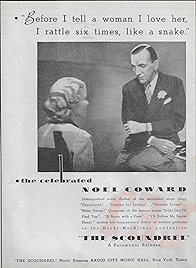The Scoundrel is a gift from two great writers to Noël Coward, a chance for the playwright, screenwriter, director, actor and impresario to do his thing in a Hollywood setting for a change, rather than on the stages of Broadway or London’s West End. A highly epigrammatic, almost drawing-room dramedy, it’s high in tone from the opening credits onwards, with the spirit of Oscar Wilde (still a living memory to many in 1935 when this was made) hovering waspishly over the entire production, the tale of an utter scoundrel (Coward) being served.
It’s Ben Hecht and Charles MacArthur writing, producing and directing. Two of the very greatest screenplay writers, Hecht and MacArthur wrote The Front Page (and therefore His Girl Friday, its remake) together as well as countless great Hollywood screenplays separately. The Scoundrel won them the Oscar for Best Original Story.
Goethe might also have got a part credit because this is a reworking of the Faust story about a terribly successful publisher (Coward) who takes an innocent writer (Julie Haydon), ruins her and then gets his comeuppance at the hands of a cruel and unforgiving fate.
Coward’s supercilious, cold, cynical and endlessly epigrammatic Anthony Mallare meets new author Cora Moore (Haydon), a romantic who believes in love as found in the works of Swinburne or Keats. The relentlessly womanising Mallare laughs at her naivety, but such is his charm that he is able to woo Cora even while declaring that “I’m not in love with you. I never will be. The best I could offer you would be a month’s diversion and six months of farewell.” Which is exactly what she gets – heartbreak. The man she was previously engaged to, decent dullard Paul Decker (Stanley Ridges), reacts differently, and takes aim at Mallare and shoots him. The bullet bounces off Mallare’s cigarette case, handily sitting in a pocket over his heart, which is probably too hard to be penetrated anyway.
Around Mallare wheel a constellation of acquaintances, employees, ex lovers, future lovers and hangers-on, but no one who actually likes him. For all his ready wit and ready cash, Mallare is armour-plated against the world, using his tongue as a his first, second and last line of defence.
Hecht and MacArthur might be great writers but they aren’t great directors and they shoot for the most part as if this were a stage play. Things spark into life only twice, when Decker takes aim with his gun at Mallare, and suddenly someone remembers what close-ups and editing can do. And again when Mallare dumps Cora and she begs him not to. Lee Garmes gets an “associate director” credit and the suspicion is that these bits are his.
As, possibly, are also later scenes, after Mallare’s plane goes down at sea and he returns as a wraith who needs to find someone, anyone, who will shed a tear over his passing, and thus allow his soul to rest in peace. Suddenly The Scoundrel picks up speed and a gothic energy that’s quite at odds with the earlier two thirds of the film.
A morality play about the disaster of dying unloved, it’s also an attack on cynicism, cocktail-party world-weariness and phoney sophistication, and while it’s tailor-made for Coward’s sort of gilded oneupmanship all is not as it should be. It’s as if someone forgot to write a proper second act, and the action suddenly shifts from the first, the introductions, to the third, the conclusions. There is no development in the middle, just an awful lot of Coward standing around being beastly to one person or another. If nothing else, it makes it very hard to feel for him in the film’s last half hour, when he needs to find someone – maybe Cora? – who will lament his death.
Good luck finding a decent copy of this film. It’s not in great shape but there is enough detail in the woolly picture to see that Julie Haydon is a fine and nuanced actor, and there’s plenty of value to be extracted also from the likes of Alexander Woollcott, a young Lionel Stander and Helen Strickland as associates of Mallare who all cordially hate his guts.
He’s an easy man to hate. For all Coward’s efforts in the film’s final scenes, that’s the biggest problem with this film, Oscar-winning story or not.
The Scoundrel – not available at Amazon right now
I am an Amazon affiliate
© Steve Morrissey 2023


